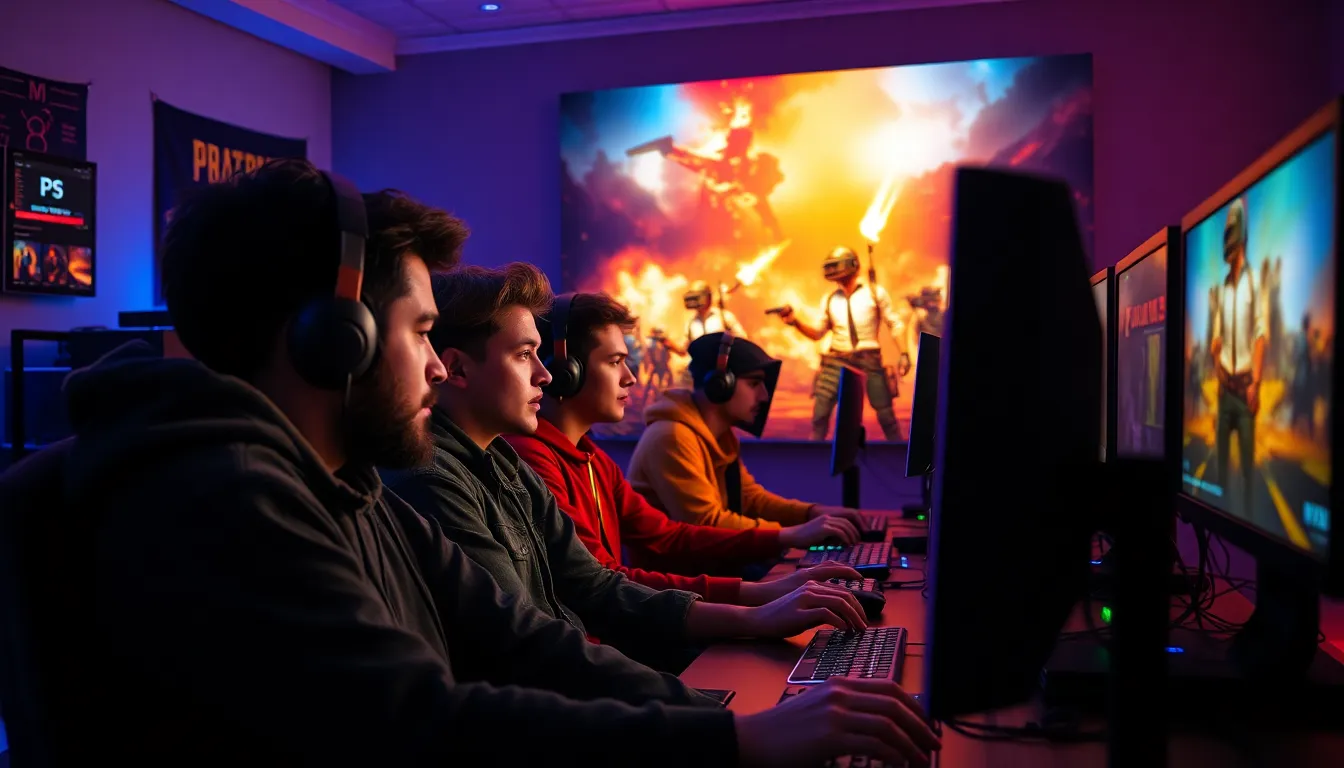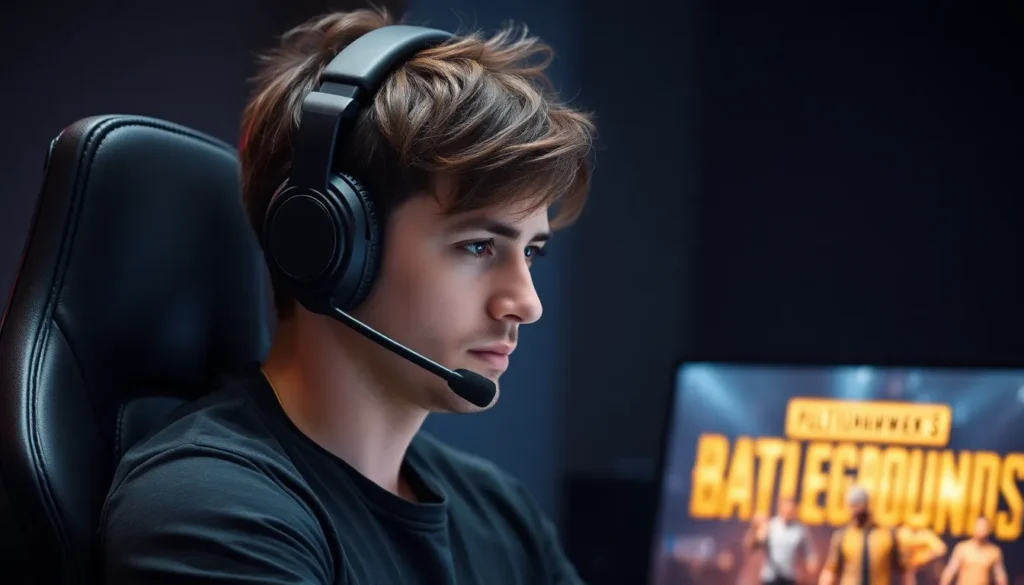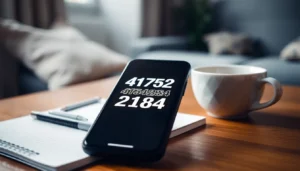Table of Contents
ToggleIn the chaotic world of PUBG, where every match can feel like a battle for survival, nothing can be more frustrating than matchmaking issues. Picture this: you drop into Erangel, ready to unleash your inner chicken dinner champion, only to find yourself paired with players who seem to have their controllers set to “God Mode.” It’s like showing up to a knife fight with a spoon—awkward and decidedly unfair.
As players dive into the battlefield, the matchmaking system often leaves them scratching their heads and wondering if it’s been sipping on too much energy drink. From mismatched skill levels to inexplicable lag, these issues can turn a thrilling experience into a test of patience. Let’s explore the quirks of PUBG matchmaking and uncover why it sometimes feels like the game is playing its own version of hide and seek with fairness.
Overview of PUBG Matchmaking Issues
PUBG players frequently encounter significant matchmaking problems. These issues stem from the game’s complex algorithms that attempt to pair players based on skill level, experience, and latency. Players often find themselves matched with opponents who vary vastly in skill, creating an uneven playing field.
Skill discrepancies cause frustration during matches. For example, a novice player might face a seasoned competitor, resulting in a lopsided experience that detracts from enjoyment. Such mismatches can lead to discouragement, making players question their abilities and willingness to continue playing.
Ping inconsistencies also contribute to matchmaking challenges. High ping can create lag, affecting a player’s responsiveness and overall performance. A player with low latency might perform well while an opponent with high latency struggles, further impacting the match’s fairness.
The lack of regional servers exacerbates these issues. Players from different regions may experience longer wait times while trying to find matches. This situation often leads to pairing players from disparate regions, resulting in varying skill levels and gameplay experiences.
Progression systems in PUBG also play a role in matchmaking dilemmas. As players level up, they may realize their opponents’ skill levels haven’t increased proportionally. This disparity can lead to sudden changes in game difficulty, leaving players feeling overwhelmed and unprepared.
Understanding these matchmaking issues is crucial for both casual and competitive players. Addressing these inconsistencies requires ongoing improvements from developers to enhance the overall experience and restore player confidence in the matchmaking system.
Causes of Matchmaking Problems

Matchmaking issues in PUBG stem from various factors that significantly impact player experience. Understanding these causes highlights the challenges players face in achieving fair competition.
Skill Level Disparity
Skill level disparity ranks among the primary causes of frustrating matchmaking. Players often encounter opponents with vastly different skills, creating imbalanced matchups. Novice players frequently find themselves against seasoned veterans, leading to demoralizing defeats. These mismatched encounters hinder the enjoyment and progression for less experienced participants. Furthermore, the algorithms designed to assess skill can sometimes overlook individual performance metrics, exacerbating the problem. Consequently, players may struggle to improve due to persistent losses, reducing their overall satisfaction with the game.
Server Connectivity Issues
Server connectivity issues also contribute to matchmaking complications. Latency inconsistencies can significantly affect gameplay, with players experiencing lag during crucial moments. Slow connections lead to frustrating experiences, especially when skill sets do not align. Players often voice grievances about being placed in matches that require high responsiveness, while their network stability fails to accommodate this need. Additionally, limited regional servers worsen wait times, as players from different areas often end up in the same matchmaking pool. This further complicates the experience, rendering skill-based matchmaking less effective and creating an uneven playing environment across regions.
Community Reactions to Matchmaking Issues
Players express significant frustration regarding PUBG’s matchmaking issues. Many report being paired against opponents with skill levels that are worlds apart, leading to discouraging gameplay experiences.
Player Experiences
Novice players often share stories of repeatedly facing highly skilled veterans, which diminishes their enjoyment. In numerous instances, matches become overwhelmingly one-sided, leaving newer players feeling powerless. Seasoned players, too, express dissatisfaction; they desire more balanced and competitive environments. Such uneven matchups often discourage players from engaging with the game. A survey conducted by PUBG Corp revealed that 68% of players experience this disparity regularly, indicating it’s a widespread concern.
Feedback and Suggestions
Community feedback frequently highlights the need for improvements in matchmaking algorithms. Many players advocate for stricter criteria that consider player skill and regional latency more effectively. Suggestions include implementing a tiered matchmaking system that guarantees fair matches. Other players recommend the introduction of more regional servers to ensure better connectivity. Developers actively monitor forums and social media for insights and prioritize addressing these vital concerns to enhance player satisfaction in the game.
Potential Solutions for Improvement
Addressing the matchmaking issues in PUBG requires a combination of developer initiatives and community suggestions. Continuous efforts aim to create a more balanced gaming experience.
Developer Initiatives
Developers focus on refining matchmaking algorithms to minimize skill discrepancies. Increasing the use of data-driven approaches helps pair players more effectively based on real-time performance. Enhancing server infrastructure can reduce latency, significantly improving overall gameplay. Introducing more regional servers addresses the long wait times players face. Taking player feedback into account promotes ongoing adjustments for better matchmaking. Regular updates reflect a commitment to evolving the gaming environment and restoring player trust.
Community Proposals
Players suggest implementing stricter skill-based matchmaking criteria to improve balance. Many advocate for the establishment of clearer skill tiers, ensuring novices do not face seasoned veterans frequently. They also call for more robust latency checks to enhance fair competition. Expanding regional server options remains a priority for many in the community, aiming to reduce performance disparities. Continuous community engagement fosters a collaborative atmosphere where players feel their voices resonate. Collectively, these proposals seek to create an equitable environment and enhance the overall PUBG experience.
The ongoing matchmaking issues in PUBG reveal significant challenges that impact player experience and satisfaction. As players voice their frustrations over skill disparities and latency problems, the need for effective solutions becomes increasingly apparent. Developers are taking steps to refine matchmaking algorithms and enhance server infrastructure based on community feedback.
By focusing on stricter skill-based matchmaking and expanding regional server options, there’s hope for a more balanced and enjoyable gaming environment. As these changes take shape, players can look forward to a future where matches feel fairer and more engaging, fostering a healthier competitive atmosphere within the PUBG community.




